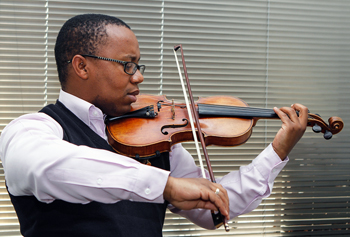Latest News Archive
Please select Category, Year, and then Month to display items
12 January 2024
|
Story Nonsindiswe Qwabe
|
Photo Sonia Small
 Since joining the UFS in 2008, Dr Grey Magaiza has worked extensively on approaches that can foster the socio-economic transformation of societies.
Since joining the UFS in 2008, Dr Grey Magaiza has worked extensively on approaches that can foster the socio-economic transformation of societies.
“The future should be one where communities can decide on their development agenda and futures. That’s the most important for me.” Dr Grey Magaiza, Deputy Director of the Centre for Gender and Africa Studies (CGAS) and Head of the Community Development programme on the Qwaqwa Campus, is passionate about capacitating communities to be agents of change and advancement. His vision for the future emphasises the empowerment of communities to take charge of their development by actively participating in decision making and the implementation of development projects that can improve their lives.
Since joining the UFS in 2008, Dr Magaiza has worked extensively on approaches that can foster the socio-economic transformation of societies. Over the years, he has crafted his research speciality into one that he is most proud of – being an interdisciplinary scientist immersed in the development of communities.
“I’m in a fortunate position of researching what I like. I say ‘fortunate’, because I’ve taken the time to understand what I’m passionate about, which is the overall field of rural livelihoods and livelihood futures – in short, community development. My research starts from an engaged university, understanding the elements that a university must use to enhance transformation and relevance to its immediate community in terms of development.”
One of the ways he has done this is by looking at social entrepreneurship as a development approach for young people in a rural setting. Through workshops with non-profit and civic organisations in Qwaqwa, Dr Magaiza has been helping these organisations to map out their needs and actively meet them through the involvement and support of external role players.
“We understand that communities are part of the national development agenda, but even that national agenda respects community knowledge and intentions and allows communities to shape their identity. A critical enabler of this is community organising. You bring back the capacity in communities to have dialogues on issues affecting them as spaces for engagement, knowledge exchange, and for people to just talk about their way forward.”
By enabling communities to define their development agenda, they can address their specific needs, challenges, and aspirations, he said. “When I look at livelihood futures, it’s quite an exciting aspect of my work – it’s like looking into a fortune tellers’ globe, because you’re not deciding for communities what they should do, but the communities themselves take those decisions.”
Odeion String Quartet receives international acclaim
2014-12-22
 |
The Odeion String Quartet (OSQ) is a flagship of the UFS and symbolises the university’s commitment to the arts. Most recently, the OSQ walked away with the award for Best Classical Music Performance at the 2014 Kanna ceremony.
It was established in 1991 as a permanent full-time resident string quartet – at present the only resident string quartet at a South African university – and functions as an independent academic department at the UFS.
The members of the quartet are Samson Diamond (leader and first violin), Sharon de Kock (violin), Jeanne-Louise Moolman (viola) and Anmari van der Westhuizen (cello). They have an extensive national and international background and are highly regarded in music circles as soloists and chamber musicians. The members of the quartet play an important strategic role in the development of symphony orchestra music and in classical music training in the Free State. They are exemplary teachers and attract students from all over the country. The Junior Odeion String Quartet and Odeion Sinfonia provide a unique chamber music training experience to selected students.
They regularly perform to critical acclaim in all the major music centres in South Africa, as well as in SADC countries such as Zimbabwe and Zambia. During 2013 they performed at concerts in Belgium, Germany and Switzerland, where they received standing ovations and very positive reviews.
The quartet is also set on giving back to musical communities around the country, with workshops offering guidance on playing techniques and life-skills that are essential for young people who intend to pursue a career in the music sector.